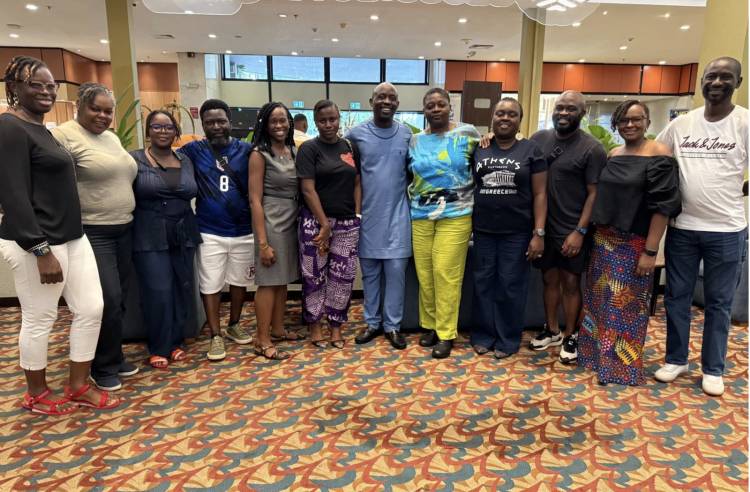Churchianity Vs. Christianity II
Churchianity Promotes Vanity Through Titles
Many Pastors don't fit into the role they bear the title for; they became pastors because it is a better title than Brother or Mr. or Ms., Mrs., or Sister.
They see people bearing titles like Engineer, Dr. Barrister, and they feel, "Pastor" is such a title too.
I know from experience that many people sitting in churches and saying, "so and so is my pastor," are like sheep without a shepherd. I know because I've ended up caring for them. I get messages from all over the world, from people seeking healing, deliverance, care, and counsel that they have not received in a local church. And locally, I visit people and bring the help they haven't received from the local church. Healing for the sick, deliverance for the oppressed, teaching and guidance for the young, and food for the hungry.
Many people who say, "So-and-so is my pastor" barely even talk to them. It's just about religious hierarchy and not actually about pastoring. Often, if there are people who are actually doing the work of pastoring within their religious institution, they are not the ones who are called "pastors." The demands of the religious institution and its programs are so great that often, what those called "pastors" are busy with is not actually pastoring.
We see in Ezekiel 34 that healing the sick and rescuing the oppressed are some essential functions of pastors. Most people I see who are called "pastors" in the institution are not healing the sick or casting out demons. If someone has a problem with demonic oppression, they usually have to go outside the local church, sometimes to a meeting in another country, or to fellowships to get the help they need. What is the problem? It's the lack of true shepherds. And "churchianity" wants me to call someone "my pastor" who is not even caring for the other people who call him their "pastor."
If I'm praying for people before and after your church services who are getting delivered from demons, but they aren't getting delivered in your meetings because that's not your priority, your "pastoring" is quite irrelevant to me. Your people are oppressed, and you're not bringing them the help they need.
How are you going to help people? I've had to deal with witchcraft and extra-mundane realities several times. When it comes to all that, you see pastors fading off and sometimes outrightly taking to their heels because they believe they could face reprisal attacks on behalf of the member who was being afflicted. How is that a pastor?
In most cases, there were no other Christians around me who knew how to deal with the situation. If you are powerless in such situations, how are you going to be my pastor? If you're going to be a "pastor" in people's lives, you must walk in God's power because the situations they face require God's power!
The apostle Paul said, "Imitate me as I imitate Christ." Why is churchianity so concerned with everyone finding a pastor, rather than being concerned with being an example of Christ's character, power, and grace for others to imitate? I find that many in churchianity care more about optics than being the real deal.
They think what a pastor is has to do with his dressing, his command of language when he preaches, keeping his hands clean in public regardless; of whatever he might be dealing with in his closet.
Optics has been given the ephod, and Power has been benched because it is raw and unpolished.
Jesus said to disregard the Jewish religious leaders because they were blind guides leading the blind. Just as in Jesus' time, many religious leaders today are blind guides leading the blind. Churchianity often doesn't care if the person you are following is blind and doesn't know where they are going. It only cares about you having someone to call your pastor.
Churchianity Sees Pastoring As Hierarchical And Fails To Understand That It Is Relational
I was talking to two guys from a local institutional church in the UK. I minister to them online and sometimes at other events, but I never attend their church services. They thought I was wrong to not have someone I call my personal pastor.
I tried to explain: "Consider your church, for example. Your church has more of the values that I share than any other local church I know. Still, if I were to say, "I'm a member of your church," and call so and so "my pastor," what difference would it make? Would anybody be caring for me more than they are now? I don't even know him. I have nothing personally against him, but I can't say there's anything particular in his life that I see that challenges my faith or makes me say, "I want that in my life." Maybe there is something I would like to imitate in his life, but we don't have the relationship for me to see it. It would make no difference for me to call him my pastor. He doesn't even have time to talk to me. I saw a big line of people waiting just to get a few words in with him.
One guy replied, "Now he wants the pastor to have all this time for him!" By saying this, he tacitly admitted that his concept of "pastoring" had nothing to do with caring for people. I've spent a lot of time in recovery houses and with street people, talking, listening, praying, and caring for them. I didn't charge them anything for it, but rather, it cost me. Yet "churchianity" wants me to pay a tithe for someone to have a full-time salary to be "my pastor," and he doesn't have even a fraction of the time for me that I have for those street people. And many Christians think that's what pastoring is about.
I'm honest. I'm not going to call someone "my pastor" for churchianity's sake if he isn't pastoring me, doesn't have time for me, and isn't an example challenging me to grow in Christ! Do you want to pastor me? Will you lay down your life for me?
The Apostle Paul said, "I may not be an apostle to others, but I am to you." He laid a foundation for their faith, discipled them, served them, and laid down their life for them. The "Churchianity" mindset has trouble understanding that plenty of people have served as mentors and examples to form and build me up in the Christian faith, but they are not the local church leaders in this city! Some of them may genuinely be pastors to others, but they are not to me. If Christians think someone needs to be cared for, why don't they just care for them instead of telling them they need to find a pastor?
Churchianity Expects Perpetual Spiritual Infancy
Churchianity has no grid for spiritual maturity. They talk about the importance of discipleship, but they are often really hindering the people they think they are discipling from coming to maturity. They don't understand that people don't stay in the university all their lives. They graduate and get jobs after a few years. The idea of imitating Jesus, who told his disciples, "It's better for you that I leave" after three and a half years, is terrifying. Jesus' disciples had a "graduation."
Churchianity seems to expect you to be always struggling, always falling into sin, always dependent. They are there to give you a bottle and change your diaper. But Jesus said when a disciple is fully trained, he will be like his master. And he took three and a half years to train his disciples, about the time of a university education.
Paul said he laid a foundation in the lives of believers and strove to bring them to maturity so they would be established in Christ. Churchianity can't understand if you already have a foundation built in your life and have already been discipled. I am in another country. Several people in the past were examples who helped disciple me and lay that foundation, but it wasn't the local church leaders in Goiania!
I'm not looking for someone to give me a bottle of milk or change my diaper. I'm not looking for someone to disciple me and lay again the elementary teachings about Christ and the foundations for my faith. Hebrews 5:12 rebukes the Hebrews for needing to be taught the elementary truths again and needing milk, not solid food, when they ought to already be teachers. Hebrews 6:1 says "Therefore let us move beyond the elementary teachings about Christ and be taken forward to maturity, not laying again the foundation..."
That doesn't mean that we ever stop learning or needing to be teachable and relate to other Christians. But it does mean there is a change that happens, and an engineer's place is not in a classroom learning that 5 times 5 is 25, but making blueprints for buildings and bridges and doing what he was trained to do. Churchianity's notion of "needing a pastor" and "needing discipleship" is putting me in a kindergarten class, and that would hinder me from obeying Jesus and doing what I was trained to do.
PS: Having Lunch with delegates from the USA, Canada, Ghana, and the United Kingdom after the GSWMI Annual Convention, which was held in Pneuma City, Oyo State, from October 1-October 5, yesterday.
We discussed a lot about the things I am writing about today and resolved to do more to bring the realities of Christ to the coming generations outside of religion.
















Comments (0)
Facebook Comments (0)